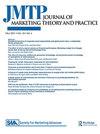How and when brand coolness transforms product quality judgments into positive word of mouth and intentions to buy/use
IF 5.3
Q2 BUSINESS
引用次数: 15
Abstract
ABSTRACT Brand coolness is a relatively understudied but important marketing phenomenon that only recently has received systematic scrutiny. We investigate a multidimensional structure of brand coolness and show how it mediates the effects of product quality on word of mouth communication and on intentions to buy/use cool brands. We also demonstrate under what conditions brand coolness influences WOM and intentions. The self-concept, rooted in materialism and expressed as the desire to impress other people and to compare oneself to others so as to emulate them, serves to regulate the effects of brand coolness in a negative way on WOM and intentions, thereby fulfilling the autonomous function of brand coolness for consumers described in the past as one important aspect of brand coolness. In order to show the incremental contribution of brand coolness in predicting WOM and decisions to buy/use cool brands, the effects of brand coolness are tested in head-to-head comparisons with the influence of self-brand connections and attitudes toward cool brands, which are classically studied brand drivers, on a representative sample of 400 adult Americans aged 20–40 years inclusive.品牌冷静如何以及何时将产品质量判断转化为积极的口碑和购买/使用意向
品牌酷炫是一个相对未被充分研究但重要的营销现象,直到最近才得到系统的审查。我们研究了品牌酷度的多维结构,并展示了它如何中介产品质量对口碑传播和购买/使用酷品牌的意图的影响。我们还论证了在何种条件下,品牌冷度会影响口碑和意向。自我概念源于物质主义,表现为给他人留下深刻印象的欲望,并将自己与他人进行比较,以模仿他人。自我概念以消极的方式调节品牌酷炫对口碑和意向的影响,从而实现品牌酷炫对消费者的自主功能,这是过去品牌酷炫的一个重要方面。为了显示品牌酷炫在预测口碑和购买/使用酷炫品牌决策方面的贡献,我们在400名20-40岁的美国成年人的代表性样本上,对品牌酷炫的影响与自我品牌联系和对酷炫品牌态度的影响进行了正面比较,这是经典研究的品牌驱动因素。
本文章由计算机程序翻译,如有差异,请以英文原文为准。
求助全文
约1分钟内获得全文
求助全文
来源期刊

Journal of Marketing Theory and Practice
BUSINESS-
CiteScore
6.80
自引率
6.70%
发文量
37
期刊介绍:
The Journal of Marketing Theory & Practice is devoted to the publication of peer-reviewed articles addressing substantive, managerial issues in marketing. In the context of developing, enhancing, and disseminating marketing knowledge, JMTP publishes both conceptual and empirical work, so long as the work provides strong implications for the managerial practice of marketing. Unlike other marketing journals that may be more focused on specific methodological approaches, deal with theoretical issues without regard to application, or represent various subfields of marketing, JMTP is positioned as a general marketing journal affording a quality outlet for more managerially-oriented research across the scope of the field.
 求助内容:
求助内容: 应助结果提醒方式:
应助结果提醒方式:


